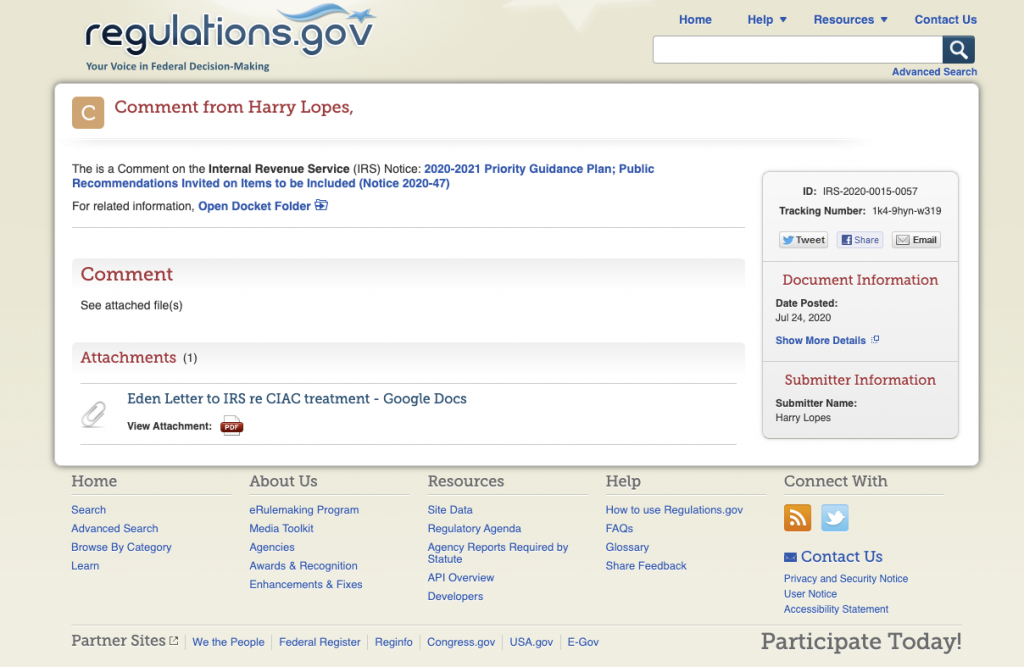“I am writing to ask you to commit in the priority guidance plan to clarify Notice 2016−36 to address what some utilities believe is an ambiguity. The ambiguity is making it more expensive for developers of community solar projects and some commercial− and industrial−scale solar projects to connect such projects to the utility grid.
Notice 2016−36 addresses when utilities must report as income payments they receive from independent electricity generators to reimburse for the cost of grid improvements the utilities must make to allow the generators to connect new power plants to the grid.
Cost reimbursements that fit in a “safe harbor” do not have to be reported by utilities as income.
Notice 2016−36 updated an existing safe harbor. Among other things, it tried to make clear that the safe harbor applies whether the electricity from a new power plant reaches the grid by connecting to a utility−owned transmission line or a utility distribution line. Transmission lines are like the interstate highway. Distribution lines are like neighborhood roads.
The notice said in an introductory paragraph explaining the intention that “a generator (such as a solar or wind farm) may contribute an intertie to a utility [i.e., reimburse for the cost of grid improvements made by the utility] that qualifies under the new safe harbor even if the generator is interconnected with a distribution system, rather than a transmission system (emphasis added), if all the requirements under section III.C of this notice are met.” Section III.C is a list of boxes that must be checked to fit in the safe harbor. One such box is “[t]he intertie will be used for transmitting electricity.” See Notice 2016−36 at section III.C.4.
Some utilities are reading the word “transmitting” to rule out use of the safe harbor for cost reimbursements for power plants connecting to distribution lines or, in some cases, for improvements to distribution lines −− as opposed to transmission lines −− in cases where the utility must make improvements to both types of lines to accommodate an additional power plant. They concede this was not the intention but do not want to take a chance on account of the mismatch between the actual words of the safe harbor and the statement of intention.
This may be most relevant to the growing new “community solar” industry. Community solar projects are utility−scale solar arrays. Local businesses and residents subscribe essentially for a share of the electricity produced by the array. They pay the owner of the array a monthly or quarterly subscription fee. The owner of the array sends all the electricity to the local utility. The subscribers continue to buy the electricity they use from the local utility, but they are given bill credits by the utility for their shares of electricity supplied from the community solar array.
Community solar arrays sometimes connect to distribution rather than transmission lines. From a tax policy standpoint, it is hard to see why this should make a difference. The notice said the intention was to cover both.
One community solar company ended up litigating against a New England utility over whether the utility had to report cost reimbursements to upgrade its facilities to accommodate a community solar project as income and, in June 2020, the Rhode Island Supreme Court said that, given the lack of clarity in Notice 2016−36, it was reasonable for the state public utilities commission and the utility to conclude that the safe harbor does not apply to distribution−line connections. However, in its opinion, the Rhode Island Supreme Court expressed its “fervent hope that the IRS will provide clear and concise guidance to these parties in the near future.”
It is important for the IRS to clear up this ambiguity since it appears that independent generators may have no other avenue for redress.”
read the letter PDF
Lopes, Harry. 22 July 2020.
